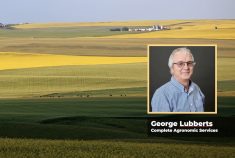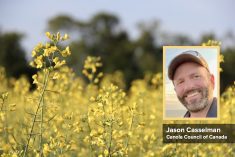There was a time when growing crops was fairly straightforward. You planted in spring, sprayed in summer and harvested in fall. There weren’t all that many varieties to choose from. Chemical inputs were limited. The provincial guides to field crop protection were only a few pages long.
Today, there are scores of registered varieties and new ones every year. Crop protection guides are now thick volumes with dozens of brand names, and chemistries must be rotated to avoid resistance. New crops such as soybeans, pulses and corn require specialized management skills.
Read Also

How scientists are using DNA and climate data to breed crops of the future
A method for forecasting how crops will perform in different environments so that plant breeders can quickly select the best parents for new, climate-resilient varieties.
As a result, growers can have trouble keeping up with rapid advancements in technology. Even if they are up to date, they don’t always have the time to monitor thousands of crop acres using the new technologies.
The CCA program
This is where professional crop advisers come in.
A new breed of agronomists called Certified Crop Advisers (CCAs) provides fee-for-service crop management and production advice, backed up by the CCA designation to give growers the assurance they’re getting a recognized level of expertise in crop consulting, says Curtis Cavers, the new chair of the Prairie Certified Crop Adviser Board, which administers the program in Manitoba, Saskatchewan and Alberta.
“As farms get larger and larger in the amount of workload and number of acres to cover, it makes economic sense to have an expert fee-for-service provider for this kind of work,” says Cavers. “That way you’re getting the best available service at the right time, as well as the best recommendations to maximize yields and profitability.”
The CCA program originated in 1991 through the American Society of Agronomy. It was introduced into Western Canada by the Canadian Association of Agricultural Retailers (CAAR), whose members often represent U.S. companies. Today an estimated 950 CCA members advise farmers on the Prairies, although not all act as fee-for-service consultants.
The voluntary certification program qualifies agronomists to give farmers information about managing crops, soil, water, nutrients, and pests. It also provides assurance the information comes from a recognized, qualified professional, says Jim Weir, executive director of the Manitoba Institute of Agrologists.
“It’s in farmers’ best interests to make sure they’re hiring someone with some qualifications to give them crop advice,” Weir says. “I wouldn’t like to get legal advice from someone who isn’t a lawyer. I’d be at risk.”
Larry Durand, an independent consulting agrologist in Humboldt, Sask., says some growers want to be sure they’re at the cutting edge and not missing out on new developments. Some, especially large operators, don’t have time to monitor thousands of acres. Some just want to try out something new but lack the expertise.
“Sometimes, frankly, it’s hard to keep up with all the new technology that comes out,” Durand says. “They might want a professional with the time to look at these technologies and decide which ones are applicable to different farming operations.”
Do you need help?
The first step in selecting a crop adviser is to decide if you actually need one. According to Alberta Agriculture and Forestry, producers should decide if they are satisfied that their yields reflect the level of inputs, and whether they are satisfied with their own crop management knowledge. Questions producers should ask themselves include:
- Do you have a good knowledge of weed identification?
- Can you identify diseases and insects in your crops?
- Can you interpret laboratory results for soil testing?
- Do you know the best fertilizer management practices for different crops?
- Do you know what specialized varieties are best for your particular area?
If the answers to these questions are “no” or “not sure,” hiring an agronomist might be beneficial.
Now that you’ve decided to engage a crop adviser, where do you go to find one? Agri-retailers and chemical company representatives are good sources. So are crop production clubs and government extension personnel, and neighbours may be able to suggest names.
The best approach is to shop around because the field is limited, and everybody knows everybody else, Durand says. “If I were a producer, I would definitely ask other people in the industry.”
If you’re going to hire a crop adviser, you have the right — indeed, the responsibility — to question them first. Durand recommends an interview, either formal or informal, to sound out candidates and learn more about them. Questions could include: What is your experience? How long have you been in the business? What’s your education? And — perhaps most important — what’s your production philosophy? Compatibility is critical.
“You might be concerned about keeping input costs down but your agronomist may want you to swing for the fence (maximize inputs). It might not be a good match,” says Durand.
Agree on fees
Signed contracts spelling out terms and expectations, while not mandatory, are a good idea. That way, everyone knows what they’re getting. Per-acre fees are a fairly standard method of payment but the amount will vary with the service. Durand says a one-time consultation can cost as little as 50 cents an acre. But a cradle-to-grave service on a high-value crop such as potatoes, where the agronomist might be out in the field several times a week, can run up to $12 to $15 an acre.
On the other hand, some services such as diagnostics or forensics (e.g. spray drift damage) may be charged per hour.
Durand also recommends making sure incidental charges, such as lab fees for soil or tissue-testing, are spelled out in advance. Are they included in the fee or are they over and above that? A producer doesn’t want unexpected surprises when the bill arrives.
Even though the adviser will provide the best service they can, Durand stresses there is no guarantee for a successful crop. The producer has to know that going in.
“Personally, I make it clear with clients before I start with them that I’ll make recommendations based on the best information I have at the time. But nothing is ever guaranteed. Agronomy is never black and white. It’s many shades of grey,” Durand says. “Once you lay out these things up front, most producers understand that all the best intentions don’t necessarily make a crop.”
Durand compares hiring a crop adviser to making an investment. You hope the money you put in will give you more money later on. Good professional advice can result in a few more bushels an acre or skipping an unnecessary fungicide application.
Higher yields plus lower input costs equal financial benefits.
Dispute settlement
But sometimes complaints can arise. Producers may feel they didn’t get the right advice or the service was lacking. Should that happen, CCA boards have an established procedure to follow.
Brent Flaten, past-chair of the Prairie CCA board, says written complaints can be submitted to a local or even international board for examination. If the board finds the complaint is justified, disciplinary action can be taken against the crop adviser. Flaten says the Prairie CCA board has received a few complaints in the past, although none resulted in discipline.
Flaten says CCAs must follow a high level of standards and ethics which are spelled out on the association’s website. They must follow generally accepted practices and cannot offer misleading or detrimental advice. If they do, there can be consequences.
“A lot of it is based on reputation,” Flaten says. “If somebody’s not giving the right information, word gets out pretty quick.”
At the same time, Flaten stresses the CCA board does not have the power to force settlements. That has to happen through the courts. If there is a financial settlement, professional liability insurance may cover it.
CCAs and P.Ags
Although CCA is self-governing, it is not regulated by provincial legislation and does not have regulatory powers. That belongs to provincial agrology institutes. Institute members have a university education in agrology and possess a P.Ag (professional agrologist) designation. CCA is a training program certifying that members have passed examinations and have the necessary skills to do their job.
Although agrology institutes and CCA are separate, they complement each other. Agrology institutes are provincially legislated bodies ensuring standards and compliance. CCA is a voluntary program targeting agronomists. It is a means of showing they are current in their field and receive regular, ongoing training. To be a certified CCA in Western Canada, you first have to be a P.Ag.
“As soon as somebody starts providing knowledge and advice to a third party such as a farmer, the expectation under provincial law is that everybody is registered,” says the Manitoba Institute of Agrologists’ Jim Weir.















